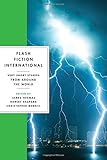 Reviewed by Ruth Latta
Reviewed by Ruth Latta
Flash Fiction International: Very Short Stories from Around the World
edited by James Thomas, Robert Shapard and Christopher Merrill
W. W. Norton & Company
April 13, 2015, ISBN 978-0-393-34607-7, Paperback: 288 pages
Flash Fiction International: Very Short Stories from Around the World consists of eighty six “microfictions” from all six continents. Fifteen authors from the United States are included, with the next largest group from Mexico (six) and Argentina (five.) New Zealand has two authors represented, Canada two, Australia, one.
Editors James Thomas and Robert Shapard compiled and edited two earlier collections of flash fiction in English, in 1992 and 2005, as well as Sudden Fiction Latino (Latin American short stories). In this current project they are joined by Christopher Merrill, director of the University of Iowa’s International Writing Program. To access as wide a pool of stories as possible, the editors sent out calls for open submissions to several very large American writers organizations, among them the AWP, and received over a thousand submissions from them. They also received about a thousand submissions from open calls to translators groups, including the American Literary Translators Association and overseas groups. They also contacted scores of American literary magazines, asking them to get the word out, and in addition, logged many hours in libraries (both online and brick-and-mortar) researching.
“Ten thousand stories later…we made our final cuts,” they write in their introduction. “We selected the best, not trying for the widest representation and giving hardly any thought to subject matter.”
At the end, they include a section called “Flash Theory” with definitions and descriptions of flash fiction by well-known authors like Jorge Luis Borges, who wrote: “It is laborious and impoverishing madness to compose vast books, to expound over five hundred pages an idea that orally can be expressed perfectly well in a few minutes.
Luisa Valenzuela is quoted as saying: “In our demanding world, practical time for reading is limited”, hence the enthusiasm for flash fiction. Author Alan Cheuse writes, “Here’s the cure for our supposedly lagging attention spans: very very short stories from around the globe…A brilliant demonstration that less can be more and that readers can find entire worlds in a page or two.”
Well, maybe, but to many of us, a long story by an author like the Nobel Prize winning Canadian Alice Munro is a deeper, richer experience than reading a microfiction. Munro, incidentally, is able to “write short”; her very short story, “Prue”, is famous.
A quickie read is not necessarily a satisfying experience. Taking time out of our busy schedules to read at some length gives us the opportunity for quiet contemplation and the suspension of our cares. It also allows us to sort ourselves out by comparing our experiences and reactions to those of fictional characters. Canadian psychologist and author Joseph Gold says in Read for Your Life that reading in Western culture serves the same calming purpose as meditation does in Eastern culture.
Sometimes, reading Flash Fiction International, I enjoyed the company of engaging characters only to find that our sojourn had ended abruptly. Some stories seemed off to a great start but never went anywhere. My favourites were engaging, not too experimental, and felt complete, not truncated. Among these is “First Impressions” by Ricardo Sumalavia of Peru, a humorous story about an exciting woman, a teenager in an after-school job, and a poem set in type on a printing press.
Two prisoner-of-war stories will certainly stick in my mind. “Prisoner of War”, by Muna Fadhil of Iraq, disturbs the reader in an unexpected way. “The Five New Sons”, by Zakaria Tamer of Syria, another story about the adjustment of a newly released prisoner, is similar in theme to the 1991 Swedish movie, The Ox, except that the latter has a positive resolution.
“Night Drive” by Rubem Fonseca of Brazil is a Stephen Kingish story that shows the Mr. Hyde side of a seemingly benign Dr. Jekyll. Another story that I admire, “The Snake” by Eric Rugara of Kenya, is, on the surface, a picture of family cooperation to band together promptly to rid their home of a snake. It may also be a metaphor for the power of united action against any creeping threat.
With eighty-six stories to choose from it is easy for a reader to find something s/he likes in this collection.
Ruth Latta has been among the winners of local contests for acrostic flash fiction, and has had a few very short stories published in anthologies. Her three short story collections, A Wild Streak, Save the Last Dance for Me, and Winter Moon, are made up of her previously published stories of over 2,000 words. Visit her books blog at http://ruthlattabooks.blogspot.com